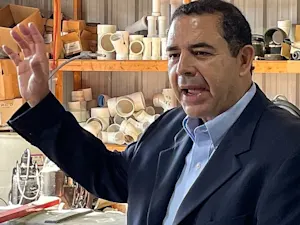
Kremlin Forced to Respond After Trump's 'Nuke Threat'
In a post that rattled the world stage, President Donald Trump didn't mince words. On June 22, 2025, he warned Russia that any attempt to supply nuclear warheads to Iran would trigger the unleashing of America's "most powerful and lethal weapons ever built" — a threat some analysts are calling the most dangerous escalation of his presidency to date, Metro reported.
The dramatic ultimatum follows a series of U.S. airstrikes on Iranian nuclear facilities as part of Operation Midnight Hammer, an intensifying U.S.-Israel campaign targeting Iran's weapons infrastructure. Now, with Trump's rhetoric and Russia's nuclear posturing colliding, the world finds itself teetering on the brink of a superpower showdown.
The Ultimatum Heard Around the World
Trump's warning came just two days after U.S. bombers pounded three major Iranian nuclear sites — Fordow, Natanz, and Esfahan — with "bunker busting" bombs, as reported by Metro. Trump boasted that the mission was a complete success and hinted the hardware used was only a glimpse of America's might. But it was his comments about U.S. nuclear submarines that truly stunned observers.
Trump wrote on Truth Social in direct response to Russian Security Council Deputy Chairman Dmitry Medvedev, who had posted that "a number of countries are ready to directly supply Iran with their own nuclear warheads." Trump seized on the comment, calling out the "N word" — his euphemism for nuclear — and demanding confirmation stating, "If he did say that, and, if confirmed, please let me know, IMMEDIATELY," according to Metro.
Trump continued, "By the way, if anyone thinks our 'hardware' was great over the weekend, far and away the strongest and best equipment we have, 20 years advanced over the pack, is our Nuclear Submarines." He continued with, "They are the most powerful and lethal weapons ever built, and just launched the 30 Tomahawks — All 30 hit their mark perfectly."
High Stakes and Higher Tensions
The stakes couldn't be higher. Russia has long supported Iran diplomatically, but this veiled nuclear offer — even if rhetorical — has sent shockwaves through the diplomatic world. The conflict escalated after Israel's surprise attack on Iran on June 23, 2025, prompting the United States to jump in days later with coordinated strikes. Iran retaliated with missile attacks on U.S. bases in Qatar, narrowly avoided casualties thanks to interception systems.
Meanwhile, the U.S. Department of Homeland Security has issued warnings about possible terrorist threats and cyberattacks in response to the growing conflict.
Russia's Position: Bluff or Brink?
Officially, Russia has condemned the U.S. attacks. At the United Nations, Russian Ambassador Vassily Nebenzia accused the U.S. of opening "Pandora's box" and warned of unpredictable consequences, Metro reported. Yet behind the bluster, the Kremlin appears to be conflicted. President Vladimir Putin has offered to mediate between the U.S., Israel, and Iran, only to be publicly rebuffed by Trump, who told reporters, "I said, 'Do me a favor. Mediate your own. Let's mediate Russia first.' I said, 'Vladimir, let's mediate Russia first. You can worry about [this] later,'" according to Time.
Still, Russia's strategic calculus remains murky. Despite tough talk from figures like Medvedev, analysts say Moscow may be posturing to distract from its costly war in Ukraine and avoid direct military entanglement in the Middle East.
What Happens if the Line Is Crossed?
If Russia were to directly arm Iran with nuclear weapons, Trump's next steps remain unclear. His veiled threats point to submarine-based retaliation — but would the U.S. really launch a nuclear counterstrike? Vice President JD Vance insisted on NBC's "Meet the Press" the U.S. is "not at war with Iran," but rather with its nuclear program. Yet critics argue that's a distinction without a difference when American missiles are hitting Iranian soil, according to Metro.
Iran, for its part, continues to deny it's seeking nuclear arms. But after the latest strikes, even Western intelligence officials acknowledge that verification is nearly impossible — International Atomic Energy Agency (IAEA) inspectors have lost track of key uranium stockpiles amid the chaos.
Final Warning or Opening Shot?
How this unfolds — through backchannel diplomacy, renewed hostilities, or something in between — remains to be seen. Trump recently declared that a ceasefire between Iran and Israel was in effect, urging both sides not to "drop those bombs" and later expressing frustration, "These guys [have] got to calm down," the BBC reported.
But with accusations, denials, and fresh missile strikes flying within hours of the truce announcement, clarity is scarce. What is certain, however, is that Trump's message — and the nuclear threat behind it — has reshaped the global chessboard. Whether it's a masterstroke or the start of a deeper crisis depends on what comes next.
References: Trump threatens to unleash 'most lethal weapons ever built' if Iran is supplied nukes | As Trump Considers Striking Iran, Russia Warns World Is 'Millimeters' Away From Nuclear Catastrophe | Ukraine showers Trump with praise for strikes on Iran while ex-Russian prez floats giving Tehran nukes | What we know about the Iran-Israel ceasefire






















